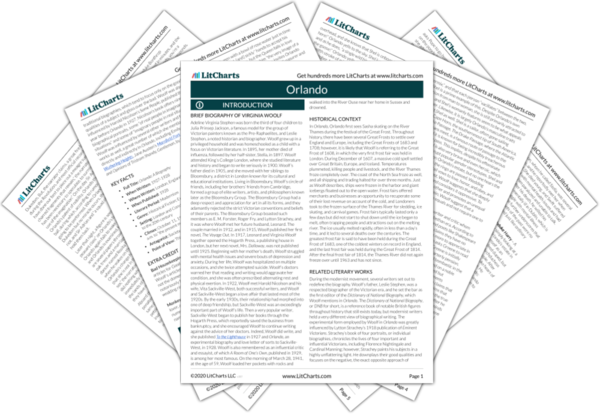Alexander Pope Quotes in Orlando
Then the little gentleman said,
He said next,
He said finally,*
Here, it cannot be denied, was true wit, true wisdom, true profundity. The company was thrown into complete dismay. One such saying was bad enough; but three, one after another, on the same evening! No society could survive it.
“Mr. Pope,” said old Lady R. in a voice trembling with sarcastic fury, “you are pleased to be witty.” Mr. Pope flushed red. Nobody spoke a word. They sat in dead silence some twenty minutes. Then, one by one, they rose and slunk from the room.
[…]
*These sayings are too well known to require repetition, and besides, they are all to be found in his published works.

Unlock explanations and citation info for this and every other Orlando quote.
Plus so much more...
Get LitCharts A+It was happy for Orlando, though at first disappointing, that this should be so, for she now began to live much in the company of men of genius, yet after all they were not much different from other people. Addison, Pope, Swift, proved, she found, to be fond of tea. They liked arbours. They collected little bits of coloured glass. They adored grottoes. Rank was not distasteful to them. Praise was delightful. They wore plum-coloured suits one day and grey another. Mr. Swift had a fine malacca cane. Mr. Addison scented his handkerchiefs. Mr. Pope suffered with his head. A piece of gossip did not come amiss. Nor were they without their jealousies. (We are jotting down a few reflections that came to Orlando higgledy-piggledy.) At first, she was annoyed with herself for noticing such trifles, and kept a book in which to write down their memorable sayings, but the page remained empty.
“Ah!” he said, heaving a little sigh, which was yet comfortable enough, “Ah! my dear lady, the great days of literature are over. Marlowe, Shakespeare, Ben Jonson—those were the giants. Dryden, Pope, Addison—those were the heroes. All, all are dead now. And whom have they left us? Tennyson, Browning, Carlyle!”—he threw an immense amount of scorn into his voice. “The truth of it is,” he said, pouring himself a glass of wine, “that all our young writers are in the pay of booksellers. They turn out any trash that serves to pay their tailor’s bills. It is an age,” he said, helping himself to hors d’oeuvres, “marked by precious conceits and wild experiments—none of which the Elizabethans would have tolerated for an instant.”

Alexander Pope Quotes in Orlando
Then the little gentleman said,
He said next,
He said finally,*
Here, it cannot be denied, was true wit, true wisdom, true profundity. The company was thrown into complete dismay. One such saying was bad enough; but three, one after another, on the same evening! No society could survive it.
“Mr. Pope,” said old Lady R. in a voice trembling with sarcastic fury, “you are pleased to be witty.” Mr. Pope flushed red. Nobody spoke a word. They sat in dead silence some twenty minutes. Then, one by one, they rose and slunk from the room.
[…]
*These sayings are too well known to require repetition, and besides, they are all to be found in his published works.

Unlock explanations and citation info for this and every other Orlando quote.
Plus so much more...
Get LitCharts A+It was happy for Orlando, though at first disappointing, that this should be so, for she now began to live much in the company of men of genius, yet after all they were not much different from other people. Addison, Pope, Swift, proved, she found, to be fond of tea. They liked arbours. They collected little bits of coloured glass. They adored grottoes. Rank was not distasteful to them. Praise was delightful. They wore plum-coloured suits one day and grey another. Mr. Swift had a fine malacca cane. Mr. Addison scented his handkerchiefs. Mr. Pope suffered with his head. A piece of gossip did not come amiss. Nor were they without their jealousies. (We are jotting down a few reflections that came to Orlando higgledy-piggledy.) At first, she was annoyed with herself for noticing such trifles, and kept a book in which to write down their memorable sayings, but the page remained empty.
“Ah!” he said, heaving a little sigh, which was yet comfortable enough, “Ah! my dear lady, the great days of literature are over. Marlowe, Shakespeare, Ben Jonson—those were the giants. Dryden, Pope, Addison—those were the heroes. All, all are dead now. And whom have they left us? Tennyson, Browning, Carlyle!”—he threw an immense amount of scorn into his voice. “The truth of it is,” he said, pouring himself a glass of wine, “that all our young writers are in the pay of booksellers. They turn out any trash that serves to pay their tailor’s bills. It is an age,” he said, helping himself to hors d’oeuvres, “marked by precious conceits and wild experiments—none of which the Elizabethans would have tolerated for an instant.”











